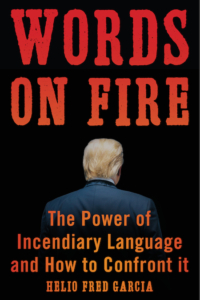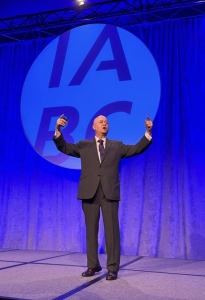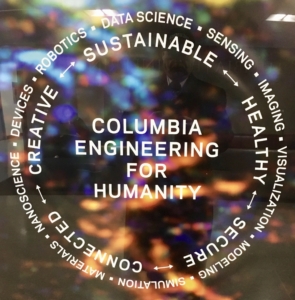Trendspotting
One of the ways Logos Consulting Group serves our clients and our network is to identify troubling social trends and to raise the alarm when we believe those trends are likely to affect clients.
And in early 2009 we noticed a troubling pattern: A surge of incivility by prominent people and in unexpected places. We began advising clients of the risk of such incivility becoming normalized in the workplace and in the public square. And we worried that the trend would escalate.
Over the span of more than a decade we have further raised the alarm as incivility escalated into hate crimes, then terrorism, and then insurrection. All the while American civic life became fractured. And even as a pandemic has taken more than one million American lives, the polarization and turmoil continue.
And through it all we advised clients on how to protect themselves and their people, and to live their values, especially when their people were at risk.
Disruption
Incivility took tangible form in early August 2009, soon after President Obama proposed what later became the Affordable Care Act. As members of Congress, home for the August recess, held informational town hall meetings, so-called Tea Party activists loudly disrupted those meetings. While originally described as spontaneous uprisings of citizens, the media soon recognized that the disruptions were organized by well-funded Obama opponents and followed a playbook that included these instructions:
- “Be Disruptive Early And Often: You need to rock-the-boat early in the Rep’s presentation, Watch for an opportunity to yell out and challenge the Rep’s statements early.”
- “Try To Rattle Him, Not Have An Intelligent Debate: The goal is to rattle him, get him off his prepared script and agenda. If he says something outrageous, stand up and shout out and sit right back down. Look for these opportunities before he even takes questions.”
A month later, as President Obama tried to regain control of the healthcare narrative, there was another unprecedented disruption. Obama addressed a joint session of Congress and outlined many of the misperceptions the Tea Party had spread about his healthcare initiative. At one point, South Carolina congressman Joe Wilson interrupted the President with a shout of “You lie!” Wilson was later censured by the House, but raised millions of dollars in the weeks that followed.
The incivility moved from politics to celebrity with another unprecedented and highly visible disruption during the Video Music Awards. Breakout artist Taylor Swift won Best Video by a Female Artist. As the young musician took the stage to give her acceptance speech, she was startled as rapper Kanye West stormed onstage, took Swift’s microphone out of her hand, and declared that the rightful winner should have been Beyoncé.
And we saw clients experience similar acts of incivility in the workplace and in customer interactions.
Incivility Turns to Violence

In 2011, during a Manhattan march by Occupy Wall Street activists, a New York City senior police officer pepper-sprayed the faces of peaceful protesters who were being detained behind orange netting. Police guidelines make clear that pepper spray may not be used in situations that do not require the use of physical force. Two months later, police at the University of California Davis were trying to remove several peaceful seated Occupy Wall Street protesters who were blocking a paved path on campus. A police officer systematically pepper-sprayed each of the protesters. Videos of both the New York and Davis incidents went viral on social and mainstream media. Eventually both the New York City police and the University of California Davis reached settlements with those who were sprayed.
The aberrant became normative in the following months as individuals began to use pepper spray against others. During a Black Friday sale at a southern California Walmart, a woman pepper-sprayed fellow shoppers who were trying to grab a video game in short supply. In New York City, a 14-year-old high school student used pepper spray against her classmates, sending nine to the hospital.
We advised clients to make clear that violence, including but not limited to pepper spray, was unacceptable in the workplace and that offenders would face significant consequence.
Black Lives Matter
In early 2012 Trayvon Martin, an African American teen, was killed in Sandford, Florida by a vigilante who told police the young man looked, “like he is up to no good or on drugs or something.” Although police advised George Zimmerman to not pursue the young man, Zimmerman did, eventually shooting Martin in a struggle. The police originally released Zimmerman, but after significant public outcry they brought charges. He was acquitted after claiming self-defense under Florida’s Stand-Your-Ground law.
Eighteen months later, Michael Brown, an unarmed African American teen in Ferguson, Missouri was shot multiple times by a Ferguson police officer. The police mishandled both the immediate investigation and the massive protests that followed.

These two shootings led to heightened visibility of police violence against unarmed African Americans. The Black Lives Matter movement emerged after Trayvon Martin’s murder and grew to national prominence following Michael Brown’s murder. In the years that followed, the movement grew further. In the summer of 2020, after the videotaped killing by four police officers of George Floyd, more than 25 million Americans took to the streets in solidarity with Black Lives Matter, the largest public protest in American history.
We advised clients in the aftermath of George Floyd’s murder and we were also retained by new clients who had responded ineffectively to changing stakeholder expectations to take Black Lives Matter seriously.
From Hate Crimes to Acts of Terror
In 2015 Donald Trump began his presidential campaign by demonizing immigrants and people seeking asylum in the U.S. Hate crimes against people perceived to be Latino surged. When candidate Trump called for “total and complete ban” of Muslims entering the U.S., hate crimes against people perceived to be Muslim surged.
 Throughout his presidency Trump dehumanized groups and demonized groups, rivals, and critics. Acts of violence surged against those Trump targeted. In my book Words on Fire: The Power of Incendiary Language and How to Confront It, I describe the Playbook Trump used: twelve forms of communication that create the social conditions that lead some people to accept, condone, and commit acts of violence against those Trump targets.
Throughout his presidency Trump dehumanized groups and demonized groups, rivals, and critics. Acts of violence surged against those Trump targeted. In my book Words on Fire: The Power of Incendiary Language and How to Confront It, I describe the Playbook Trump used: twelve forms of communication that create the social conditions that lead some people to accept, condone, and commit acts of violence against those Trump targets.
In the run-up to the 2018 midterm election, Trump intensified his dehumanization and demonization of Latin Americans seeking legal asylum. Trump characterized these asylum seekers using some form of the words ‘invader,’ ‘invasion,’ ‘criminal,’ ‘animal,’ or ‘killer’ with increasing frequency. Trump said one or more of these words between eight and ten times per rally in early October. In the three days before the mid-term election, Trump said one or more of these more than thirty times per rally. His rally speeches were further amplified by his social media posts. He and his allies also asserted that the purported invasion was financed by George Soros and Jewish institutions.
Incivility morphed into acts of terror. Less than two weeks before election day, a white supremacist who embraced Trump’s language committed a terror attack on a Pittsburgh synagogue, killing 11 people and wounding two others. That same week, a Trump supporter sent 16 mail bombs to more than a dozen Trump critics whom Trump had demonized on social media. In August 2019, a Trump supporter killed 32 people he perceived to be Mexican in an El Paso Walmart. He said he was protecting Texas from a “Hispanic invasion of Texas.”
And during COVID-19, Trump continued to refer to the Coronavirus as the China Virus, or Chinese Virus, or even Kung Flu. This led to a surge of hate crimes against people perceived to be Asian.
Throughout, we advised clients on ways to help members of at-risk groups both be safe and feel safe.
Stand Back and Stand By
President Trump began laying the groundwork to claim that the 2020 presidential election was illegitimate as early as the Spring of 2020, discrediting the legitimacy of mail-in ballots. By election day he was actively claiming that the election was rigged and refused to commit to a peaceful transfer of power if he lost.
In the first presidential debate in late September 2020, Trump was asked to denounce white nationalist groups, specifically the Proud Boys. Instead, he called on the group to “stand back and stand by.” The group’s leader replied on social media that they were standing by, and the Proud Boys immediately added the phrase “stand back and stand by” to their line of merchandise.
Following the election that Trump claims he won and months of misinformation, Trump called for his followers to come to Washington. Trump posted on Twitter on December 19, 2020, “Statistically impossible to have lost the 2020 Election. Big protest in D.C. on January 6th. Be there, will be wild!” January 6 was when the electoral college votes were to be certified by Congress.
As a result, what had been individualized self-directed acts of violence and terror became a coordinated event, with multiple players all participating in what became an insurrection.
Among those who responded to the call were the Proud Boys, which formed a new chapter for those coming to DC called the ‘Ministry of Self-Defense.’ On the day Trump called for people to come to DC, the head of the Proud Boys, Enrique Tarrio, spoke with Kelly Meggs, the Florida head of the militia group The Oath Keepers, which also had a meaningful presence at the January 6 insurrection. Meggs sent a message to his followers: “Trump said It’s gonna be wild!!!!!!! It’s gonna be wild!!!!!!! He wants us to make it WILD that’s what he’s saying. He called us all to the Capitol and wants us to make it wild!!! Sir Yes Sir!!! Gentlemen we are heading to DC pack your shit!!”
On January 6, as the Congress was considering the electoral count in the 2020 election, Trump addressed a crowd of thousands gathered at the Ellipse near the White House. He rallied the crowd to march to the Capitol to disrupt the proceedings. He called on Vice President Mike Pence to overturn the election. Among his remarks:
- “And we fight. We fight like hell. And if you don’t fight like hell, you’re not going to have a country anymore.”
- “All of us here today do not want to see our election victory stolen by emboldened radical-left Democrats, which is what they’re doing … We will never give up, we will never concede. It doesn’t happen. You don’t concede when there’s theft involved.”
- “Our country has had enough. We will not take it anymore and that’s what this is all about … We will stop the steal.”
- “Because you’ll never take back our country with weakness, you have to show strength and you have to be strong.”
The Proud Boys were among the first to penetrate the perimeter of the Capitol. Thousands of rally-goers eventually arrived, and more than 2,000 entered the building. Some called for the assassination of Vice President Pence, House Speaker Nancy Pelosi, and other members of Congress. One Trump supporter was killed by Capitol police as she tried to penetrate the window on a set of doors leading to the House chamber.
Five police officers who were present during the insurrection died, as did four of the insurrectionists. More than 130 police officers were injured. Of those, 15 were hospitalized, some with severe injuries.
We advised clients on ways to deal both with political polarization and the possibility that some of their employees may have been part of the Capitol attack.
And the incivility, polarization, and violence continue.
Where are We Now?
As 2022 comes to a close, the nation has experienced more than 600 mass shootings, defined as shootings with four or more fatalities, not including the gunman. This puts 2022 on track to meet or exceed last year’s record of 690 mass shootings.
Twitter’s new owner has eliminated many of the standards that previously restrained much violence-provoking rhetoric. As a result, as just one example, use of the N-word on Twitter has increased five times in the month of Elon Musk’s leadership of the social media platform.
And heightened political polarization in the new Congress is likely to spill out into the public square.
What’s Next?
What are we advising our clients? That it’s likely to get worse before it gets better; that it will likely take an inflection point of unprecedented proportion before the pendulum begins to move back toward civility.
As Trump faces a range of federal, state, and local criminal investigations, it’s just a matter of time before he is indicted. We need to take very seriously Senator Lindsey Graham’s prediction that there will be “riots in the streets” if Trump should be prosecuted.
So, what can leaders do to prepare?
- First, note the pattern of the escalation of incivility… to dehumanization… to acts of individual violence… to acts of collective violence.
- Second, call out the pattern and declare that you will hold people in your organization accountable for provoking or committing violence.
- Third, equip yourself to be an accelerator of a return to civility. One good place to start is to read a book by my dear friend and mentor, Jim Lukaszewski and Steve Harrison, The Decency Code: The Leader’s Path to Building Integrity and Trust.
In the meantime, Logos Consulting Group will continue our trendspotting and share our concerns and insights with our clients and our network.
This reflective piece is part of our 20th anniversary celebration. Throughout this anniversary year, we will be sharing a series of reflections on the shifts and trends we have been following in business and in the world over the past twenty years, as well as advice to leaders and organizations navigating through the challenges we see today.

 Garcia examined the ways in which disinformation and misinformation can – and have – put human life and democracy at risk. He then outlined a disinformation playbook that, once known, can be used to stop the spread of disinformation.
Garcia examined the ways in which disinformation and misinformation can – and have – put human life and democracy at risk. He then outlined a disinformation playbook that, once known, can be used to stop the spread of disinformation.

 Throughout his presidency Trump dehumanized groups and demonized groups, rivals, and critics. Acts of violence surged against those Trump targeted. In my book
Throughout his presidency Trump dehumanized groups and demonized groups, rivals, and critics. Acts of violence surged against those Trump targeted. In my book 
 And there are consequences to this biologically hard-wired response. When our biological fear response is triggered, our brain diverts blood into our arms and legs – the parts of our body that enable us to either fight or take flight – and away from the parts of our brain that are responsible for higher-level reasoning. Therefore, once our biological fear response is triggered, our problem-solving and critical thinking skills become hindered.
And there are consequences to this biologically hard-wired response. When our biological fear response is triggered, our brain diverts blood into our arms and legs – the parts of our body that enable us to either fight or take flight – and away from the parts of our brain that are responsible for higher-level reasoning. Therefore, once our biological fear response is triggered, our problem-solving and critical thinking skills become hindered.